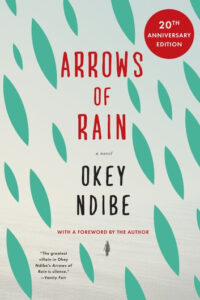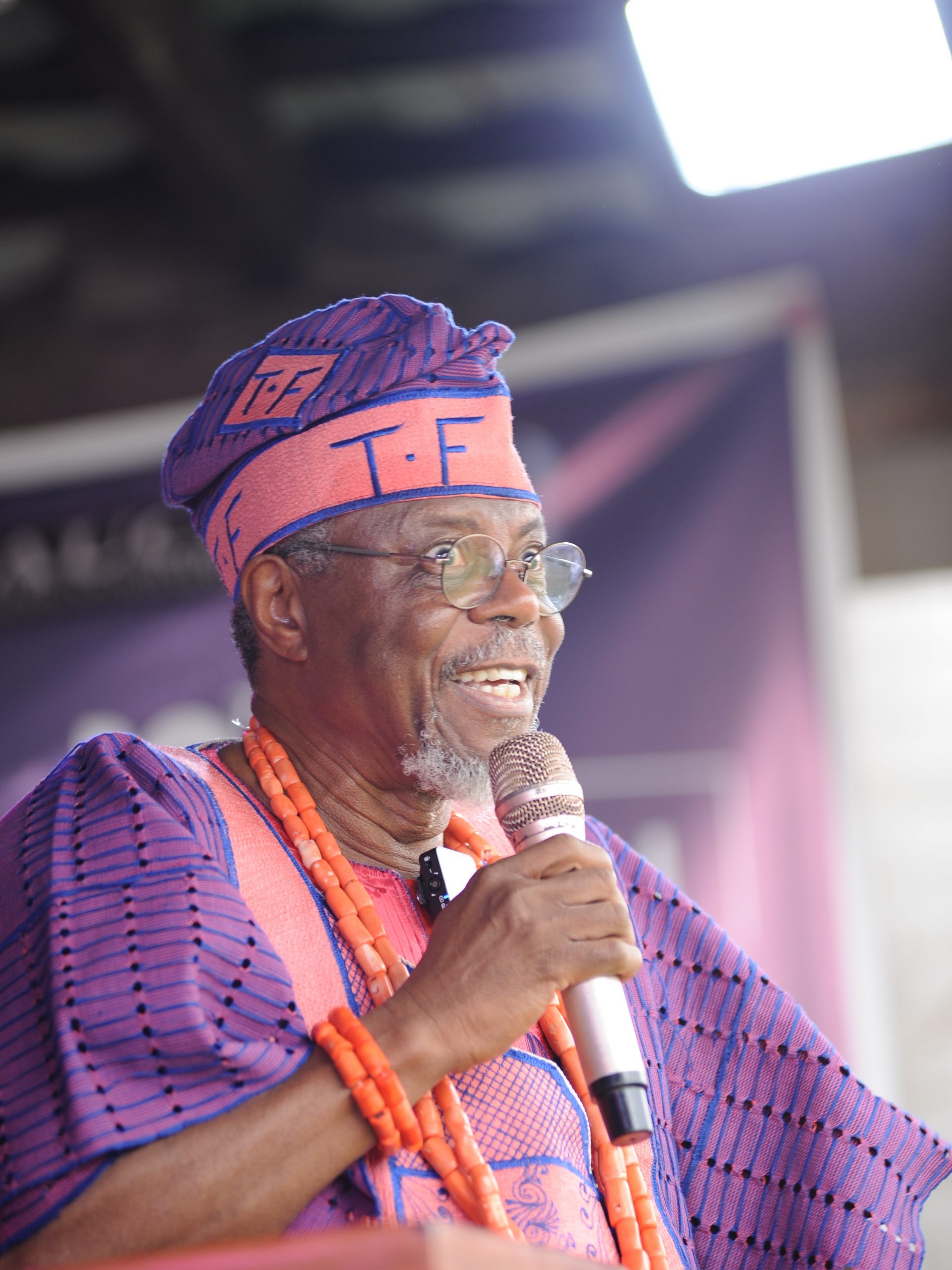By Toyin Falola
There is a saying that “fiction” is fictitious — as there is no pure work of fiction devoid of insights and influences from actual occurrences in human societies. In Okey Ndibe’s work of fiction, Arrows of Rain, the veteran journalist, public intellectual and celebrated writer taps into the depth of happenings on the African continent to deliver on the most vital role of literature — mirroring society. Set in a fictitious country called Madia, Arrows of Rain is an aggregation of the experiences and implied experiences of the average African citizen, where everyone is supposedly equal, yet some are more equal than others, and political leaders can do and undo, knowing that executive and fabricated legislative immunity will absolve them of answering for their deeds. For far too long, Africans have learned that silence is not only golden but also a saviour; to speak is too audacious and dangerous to the country-ravaging mission of those in power. To speak is to be prepared to pay for being outspoken; to be ready to be punished, maimed, unjustly incriminated and imprisoned, or even killed.
Ken Saro-Wiwa and Wole Soyinka all have two things in common: one, their activism through different media, actively speaking truth to the military powerholders of the undemocratic era in Nigeria; and two, they were both incarcerated. For these men, it was either to forcefully go into exile or fall victim to an unjust death. Saro-Wiwa and the other eight members of the Ogoni Nine could not escape into exile and were executed unjustly. Wole Soyinka had to go into exile to save his life. All these happened because these men chose to voice out, speak truth to power, and defend and advocate for the masses.
Similar to these events is the central theme of Arrows of Rain, in which Ndibe beams the spotlight on the curse of leadership in Africa and the deprivation of citizens through the travails of Bukuru, who finds himself in trouble for his honesty. The book’s first few pages introduce us to Bukuru, who becomes the prime and only suspect in the death of an unknown woman because of his presence at the time of her death. We also get familiar with Lanky, whose theatrics are not unfamiliar to any African who has encountered public workers before. There is narcissism, for which he continues to retell the story of the woman’s death to remain the centre of attention. Also, there is embellishment and story-polishing every time he retells the incident, which shows that his supposed heroic ventures to save the woman were not based on empathy or genuine care but just one of those things someone would do to gain attention. Seeing as she is now dead, Lanky has little to no regard for the solemnity of the moment or for getting her justice. He is fine with weaving several versions of the story of her death to keep the attention to himself. This is akin to accident cases where victims lose their gadgets, money, and other items to the rescuers who outrightly steal from them — the supposed empathy that made those rescuers rush to save them did not extend to helping them keep their valuables safe.

Drawing on his years of experience as a veteran journalist in Nigeria, Ndibe kills two birds of ill with one stone by first unravelling the typical dealings of the average Nigerian newsroom in a frantic chase after stories, one that has no regard for the privacy of people or is true to reporting factually. Journalism, to many, is more of a business than a good social enterprise, and it is the sad and emotion-laden stories that the editors push their teams to chase. Sometimes, the pressure to break a story within a specific period causes journalists to fabricate stories or report from twisted, largely non-existent angles. It is a show of shame that eventually does society no good.
Early in the book, readers get familiar with one of the biggest menaces spearheaded by the police force in society — more prominent on the African continent than elsewhere. Just as the craze to break stories and gain virality from emotion-laden and bad news is fast and steadily consuming the journalism industry, so is the pressure and agitation to solve cases eating away at the police force. In a frenzy to uncover cases quickly, the police latch on to the slightest bit of evidence or seeming evidence, and woe betides anyone who looks remotely like a suspect. For the police force, the chief mission is to work until they arrest just one person and then wrap the entire case around that person, whether guilty or not. This way, they can quickly solve cases and move on to the next one that arises — especially since there seems to be an endless number of new crimes. The seeming effectiveness of this “hack” is only beneficial to the force and its detectives, who are either unwilling to pursue the case, have limited resources to continue on the case, or are simply too lazy and clueless to care.
In Ndibe’s Arrows of Rain, this phenomenon comes into play early in the first chapter, where Ladi and his police detectives make Bukuru, the madman, the fall guy for the woman’s death. Bukuru fits their ill-conceived profiling: he is psychologically sick, happened to be present during the woman’s death, and will most likely have no concerned family members or friends to stand for and defend him — all the qualities that make it easy to pin the murder on him. Bukuru is soon arrested and charged with the woman’s death due to the police force’s laziness in investigating the case thoroughly and for want of another suspect. Something similar is at play: Young Nigerians are profiled according to misaligned and pre-conceived notions, and criminal offences are fabricated and spilled into their laps. This phenomenon was the driving force behind the #EndSARS protest in Nigeria when young Nigerians got tired and demanded that the government reform the police force.
General Isa Palat Bello is the succinct representation of many an African leader. Although many countries on the continent now boast of a seemingly free system of government, the mode of ruling in the countries and the blinding thirst for political positions and to remain in power is similar to Bello’s life and situation. Many wonder why African leaders crave power by all means, spend a fortune to gain it, and even risk their lives for it. It would be a valid claim if we said African leaders do all of this because once they are in office, they would make incredulously returns on any financial investments they made to get into power. But then, the craze for power in Africa goes beyond the generational wealth that may come from it. It extends to the immunity and untouchable status bestowed on African political officeholders. To be elected a leader in many African countries is to have bought the people’s loyalty; it is to be assured of continued political leadership despite non-performance and to learn to mask autocratic rule in the cloak of democracy and impose the will of the very few as the decision of all.
This also played out in Arrows of Rain in how Bello dramatically announces his decision to continue to rule. Rather than present it as his fascistic, autocratic decision, he masks it in an announcement that over 90 per cent of citizens had voted in a referendum to have him continue as the leader. Yet, Citizen A knows that he did not participate in any referendum; so does his neighbour and his neighbour’s neighbour too. Who then voted? It is the same ridiculous way African leaders share nonsensical metrics with their citizens as supposed proof of their performance. It is how they announce that they have lifted 10 million citizens out of poverty, yet, the country’s poverty level continues to rise. It is how they claim to have brought education to 50 million out-of-school children, yet, the streets are full of children during school hours.
In Madia, every citizen is equal, but some are more equal than others. Bukuru learned this the hard way. In being honest about what he saw, thus revealing the complicity of the army, the government, and even the president, Bukuru steps on many toes. This caused his travails, including his arrest and incarceration and eventual silent murder, all orchestrated by the supposed guardians of the law.
Madia is Nigeria. Madia is Kenya. Madia is working hard in Sudan. It is every African country with no working system where the truth is one of the costliest prices to pay. It is every African country where the electorate is powerless, and the elected are demigods. It is the African countries perpetually cursed with bad leadership, where selfishness is so paramount that it has turned citizens into individualistic people who care little or nothing about what others are facing, so long as their own lives are not severely impacted. These people are like the passersby and onlookers at the beach when Bukuru is whisked away by the police with little to no evidence of his complicity in the crime. Madia is every African country where the guilty sit in judgment of the guiltless, and the law is turned on its head to benefit the few.
Ndibe’s three-part compartmentalization of the novel is an ingenious approach that helps group events according to the story’s development and an even deeper layer of thematic occurrence. This is further reflected in his choice of name for the parts — Mists, Memories, and Malaise — true reflections of Bukuru’s travails, his flashbacks, and his eventual fate. Like the narrator-journalist, one is made to ponder the importance of values in a deeply corroded country like Madia (read Nigeria, Kenya, or any other African country).
In 300 pages, Ndibe poignantly touches on the most critical questions we must ask if we will ever witness true development in Africa and the transformation of African states into functioning systems. First published in 2000 and republished in 2015, Arrows of Rain is a powerful novel, a compelling work of extraordinary imagination, and Okey Ndibe’s way of demonstrating to the world that he is made of the same stuff as Africa’s literary greats like Chinua Achebe and Wole Soyinka.


